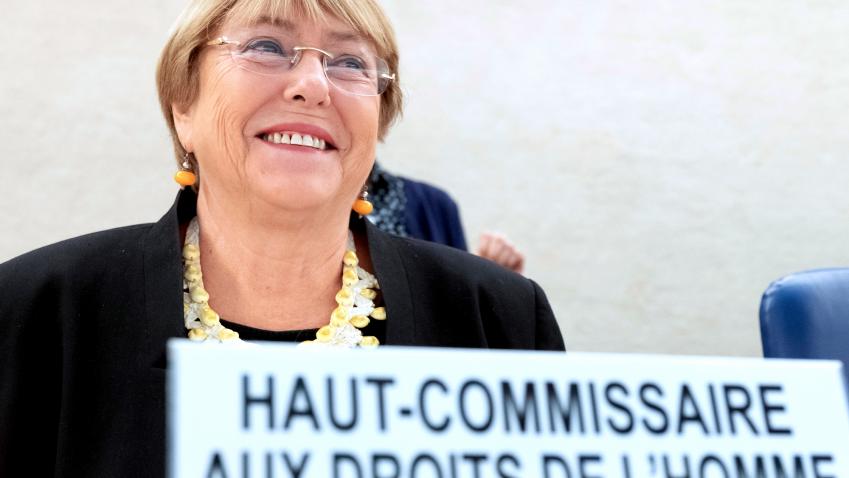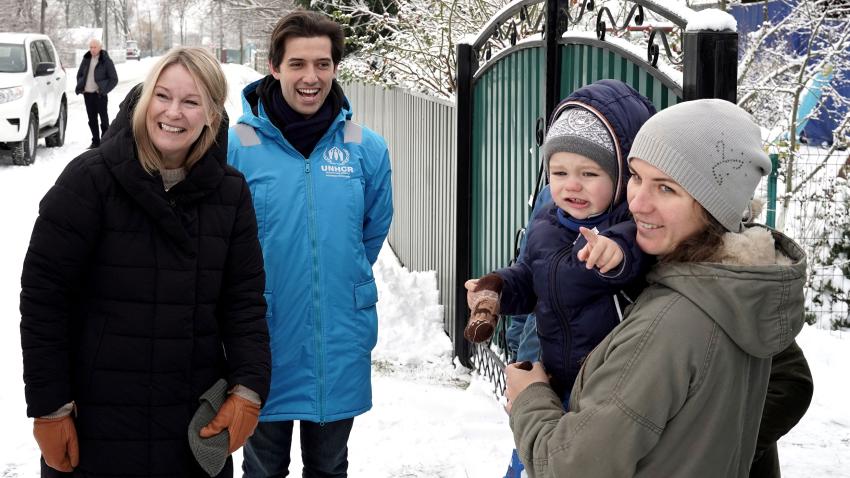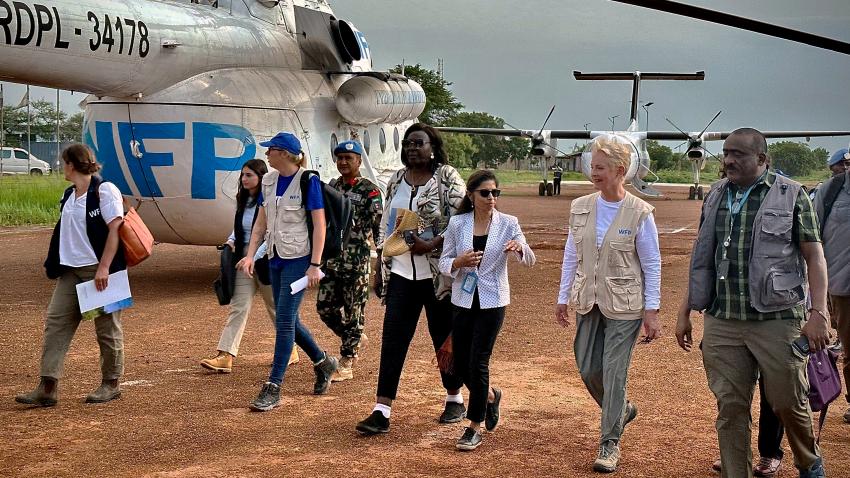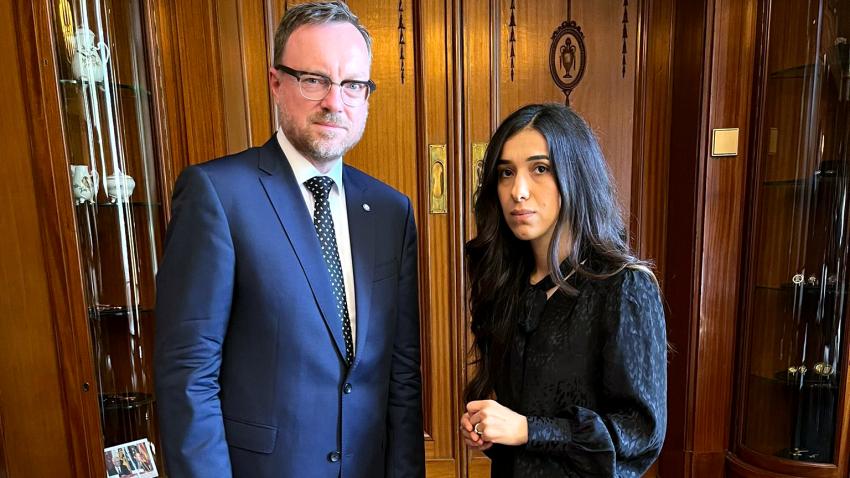"I understand the people I speak to in my current job, because I've been in their shoes: I've been arbitrarily detained. I've experienced enforced disappearance."
Michelle Bachelet was the first female President of Chile for the Socialist Party of Chile (2006–10; 2014–18). She is now the United Nations High Commissioner for Human Rights.
Michelle’s father served in the Air Force and, in 1973 after being taken prisoner during a coup that overthrew the government, he died in jail at just 50 years old. Michelle shares the harrowing stories of how she and her mother were later taken to a clandestine detention centre, her exile in Australia and East Germany, her motivations to study medicine and return to Chile and why, despite everything, she remains a prisoner of hope.
As she herself believes: "We may not be all responsible for the past, but we are responsible for the future."
Transcript and multimedia
Melissa Fleming 00:06
From the United Nations, I'm Melissa Fleming, and this is Awake At Night. Joining me today from Geneva is Michelle Bachelet, welcome to this podcast. Michelle, you are a trained doctor and you went on to serve as Chile's first female president, and you are now the United Nations High Commissioner for Human Rights. That's quite a journey! I'd like to begin by asking about your childhood in Chile though. Your father, I believe, was in the Air Force, and you moved around a lot. Can you tell us a little bit about where you moved and what your childhood was like?
Michelle Bachelet 00:56
Well, the first thing, I have to say that I had a wonderful family. My father was from the Air Force. My mother worked at the University of Chile so they both work in the public sector. That was sort of the certain values that I've received from very small. That all people are entitled of rights, and that we need to work and leave and do things so everybody can be as happy as possible. My father worked at the Air Force so he had to move for different places inside the country first of all.
I mean, I was born in the capital, but I went to live to many different regional capitals, close to the beach in the north, in Antofagasta. And afterward, my father was sent to Washington, DC, to the mission. To the Air Force mission. The Chilean Air Force mission. So when I was 12, I went to the US. So then I went to school there, I learned English. I mean, I went there without knowing any words, but then I was a year and a half there and I had the experience of knowing another country. A big country, like the US, to meet people from other regions of the world as well, that were also my classmates.


And I think all of those different things... Also, it shapes how the way you live, the way you relate to others, because you sort of start all over again, every some years having new classmates, new friends. So I think that gave me a little perspective of diversity, if I may say, and how diversity could... I mean, because it's different when you are born in a place. You grow up in that place. You study in that place, and sort of you get married in the place as well. And so you have a different perspective than when you have been elsewhere; your own country or abroad.
And on the other hand, I come from a family who was a military family, even though my mother was a civilian. But we also lived in military bases. So I have sort of the experience as a civilian living in a normal apartment, but also living in military bases. And I think that have gave me the possibility of understanding different sort of worlds, sort of languages, and but also to see good things that are happening, but also sad things that were happening.
What really shaped me, though, has been mainly the values they raised me with, in terms of believing that humanity was something very important, that we were not an island, that we were part of a big community. And that we had responsibility on that big community. And we have responsibility with people. So I think and. of course...
Melissa Fleming 03:41
Michelle, can I just interrupt you there and ask who, who taught you that?
Michelle Bachelet 03:45
Oh, my parents, my parents. Well, my father was a very… he was a great father, he played with us very much. They incentivize us to read, to hear classic music. At home, at lunch or dinner time, on the weekends, we will discuss of many different things, of course, according to our age, but we could hear very interesting things. They were really interesting cultural issues as well. So in my house, I would hear discussions even among the adults, and you could be playing around, but that was the environment where you were there about politics, but I mean, they were not politicians, but they were current politics, or the world's affairs, or the problems that they saw each day when they were working, or when they were in the bus and so on.
And afterward, also, my parents decided that, we were a middle-class family, and my parents decided that I should always go to public school. So I always went to public schools. And I think that also gave me a very interesting perspective because my classmates, you could have people from high middle-income families, but also a friend whose father was a construction worker and he would come in a moto and some other people will come in a car and some other with public transportation. I think that that made me feel the importance of democracy.
Because we were all the same at public school in my country. You use uniform. So nobody could be different from the others, everybody could have sort of certain kind of uniforms. But I think the most interesting part, I mean, not only that, in that school, we had sport options, but also, we could be in musical teams, I played the guitar. And I was in this musical team. We went to many places and we sort of competed in these events with other schools and, but also I was playing basketball or volleyball.
So at that time, I will say, being a part a student of a public school was really interesting in terms of not only getting the knowledge that the education, the formal education gives you, but also the sort of social education and knowledge that you get by having different people that come across you, and that you can learn a lot from different experiences and get your own values and your own ideas and your own positions about things.
Melissa Fleming 06:16
It sounds actually quite idyllic. Is that how you imagined this society that you were growing up in at that time?
Michelle Bachelet 06:25
Well, it was not totally idyllic, of course, but in my case, I think it was a great experience. And then I went to the University of Chile, that was the State University to study medicine. That was one of the.. ah…at the university.
Melissa Fleming 06:38
Why medicine, I wonder?


Michelle Bachelet 06:40
Well, because I think medicine... I love science, but I love also social sciences, and all the humanitarian aspects of life as well. But, at the end, everything that I chose was related to how can I make something of my life that not only can provide me with income, but mainly that can make me contribute to the people, to the world, to improve the world. But one particular issue on medicine, because I was not sure at the beginning, is that a boyfriend that I had, he had a terrible toothache.
It was a Saturday, Sunday, there was no dentists around. So I took him to the biggest emergency hospital where they did have also dental emergency. And we stood there like hours waiting for him to be seen and received certain... And I said, I want to be a doctor to change this reality because it cannot be possible that people with pain has to wait for so many hours, not well treated by the people because of course, the personnel was overwhelmed with so many patients, you know. So it's funny because, at that moment, I never thought I would become a Minister of Health. But at that time, I thought, I need to change this, I need to [do] something because this is unacceptable. It's unacceptable that health is not a right for the people. So that was what really triggered the decision of medicine.
Melissa Fleming 08:08
Interesting. So your mother then was working at the same university as a professor?
Michelle Bachelet 08:13
She was at that time. First of all, she was for many years, the Head of Finance and Administration of the University. And then afterward, when she was 40, she decided to retire and she started studying archaeology. So she's an architect, she was an archaeologist.
Melissa Fleming 08:31
And both of them were recommending to you that you pursue studies and a career and not necessarily the route of so many women at the time to just get married and have children?
Michelle Bachelet 08:44
Well, my mother was really a progressive woman, if I may say, for that time. I was 16, maybe 14, I don't remember. We had a talk and she told me, ‘Look, Michelle, you don't need to be a mother. And you don't need to get married necessarily, and be a mother and have children. You have to do in life what you think you want to do. But you have to do it good. I mean, you have to be good, or whatever you do. And in order to be able to achieve that you need to be a good student and work hard. Because then you're going to get what you want.’
Of course, she said if you want to get married, of course, and you want to have children, of course, but that's not your destiny. Women can create and build their own destiny. And you can do that. And for me, that was so clear. And also so clear because she has always worked. My father and mother were pretty progressive for the time, I would say.
Melissa Fleming 09:32
Lucky you. You also have brothers and sisters?
Michelle Bachelet 09:36
One brother. He was a fantastic guy. He went into the Air Force school because he wanted to be a pilot. But all of our family have eye issues. So he couldn't be a pilot at that time. So he decided to leave the Air Force college and he went to work in computer science.
Melissa Fleming 09:56
Well, it sounds all like a pretty wonderful life. But then in 1973, it was really turned upside down when a coup overthrew the government of Salvador Allende. And then what happened to your father?
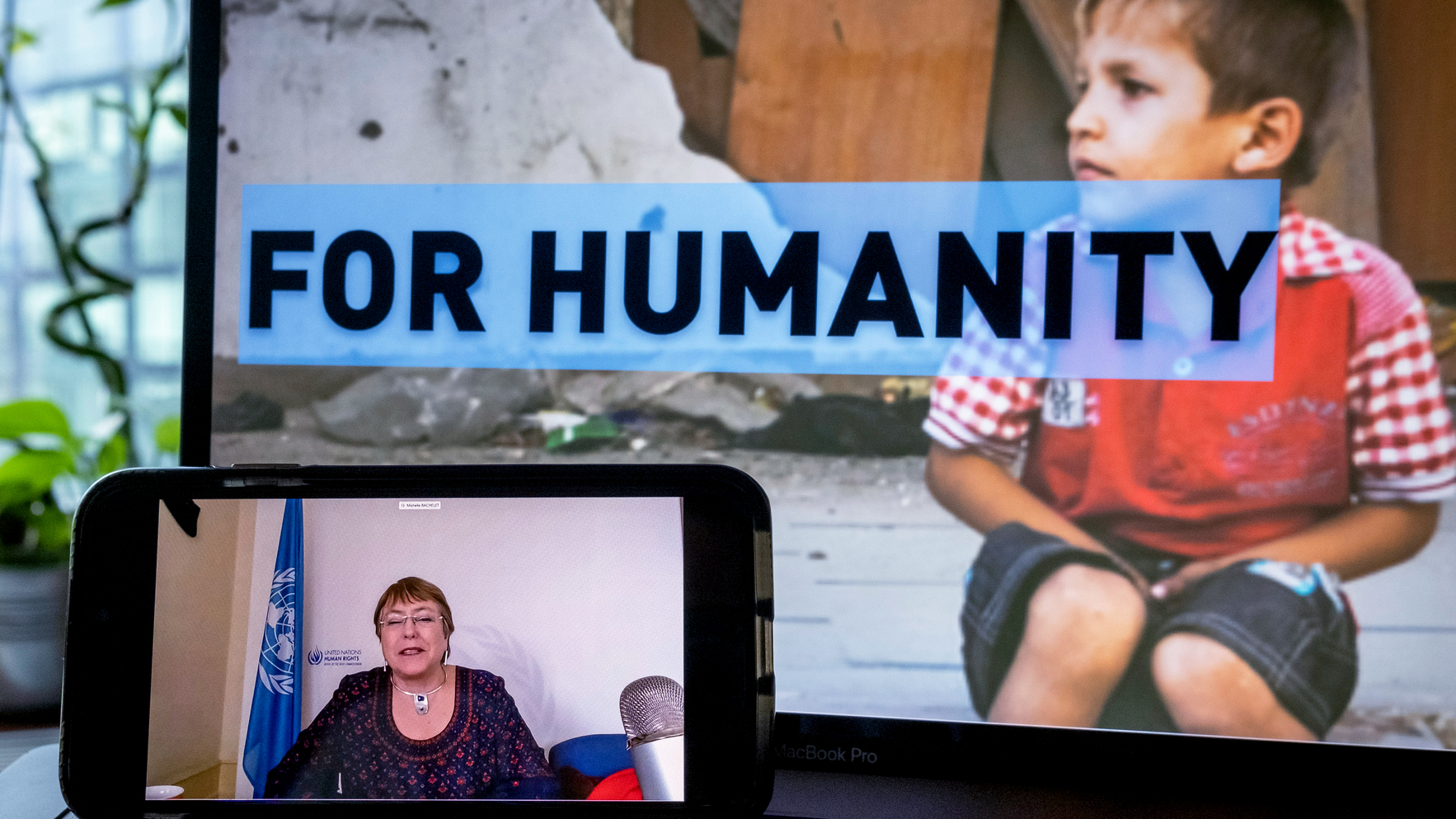
Michelle Bachelet 10:12
Well, my father was taken prisoner. What happened is Salvador Allende at the last year of his government, because his political situation was so unstable, he asked the armed forces to provide him with different generals to help them in certain issues. And there was a lack of food and things like that, because of, I mean, it was a whole political thing, and so on. But so my father was asked to be the head of this office, who will get the products and distribute to everyone, so everybody could have access to those products.
I mean, we're talking about from meat to cigarettes. So my father has to solve this and have to solve the queues because to buy things in the supermarket because there were so small amount of products they have to do queues. So he was thought to be sort of an ally to the government, even though there was a decision from the armed forces to provide three or four generals for different issues. But they knew that my father was a man who was a progressive man. And he did not agree with a coup d'état because he thought that presidents are elected, democratically, and it’s the people who will decide if a President continues or not, and not the Armed Forces through a coupe d’état.
So they took him in prison, and he was in for almost a year. And he was tortured in different ways. Psychologically, and also physically. They have him in isolation, they put him in a place close to the bed, a gun, so he could shoot himself. He did not do that, of course, but they were incentivating this kind of thing. And they brought him back to the public jail. And then he had a heart attack and he died of a heart attack.
They tried, I mean, they did not have the adequate health attention so he did not receive it. So he died there. There was a doctor, a doctor for the Air Force, who was also in jail with him. He tried to make all the medical, I would say, procedures but it was not possible. So he died, and he was 50 years old when he died. Okay, yeah. 50 years old. My father, my brother was gone to Australia some years before looking for other perspectives so we were just my mom and me. And then we continued working, trying to make advocacy and increase awareness of what was happening in my country, outside Chile, and inside Chile.
So they took us to a clandestine jail. That was February 1974, no, ‘75 sorry. At the end, would they permitted us to leave the country to go to Australia, after being two weeks disappeared, three weeks disappeared. So I always think in this job that I'm doing now, for me, when I'm speaking to people I say, you don’t need to explain me that. I’ve been there. I have been arbitrarily detained. I've been with enforced disappearance. Fortunately, I’m alive, both of us were alive, so then we went to Australia.
Melissa Fleming 13:22
I mean, that year, when your father was in prison, that must have been incredibly distressing for you. How old were you then and how did you cope? How did you get information about his situation? And what did you and your mother do to try to get him out?
Michelle Bachelet 13:41
Yeah, well, I was what, 21-22 years old. I was studying medicine. I was going to see him. They had visit once a week. We want to see him when basically whenever I could. But it was… I mean, it was very painful. First of all, because nobody knew what was gonna happen. We were hearing from so many other people in jail, that suddenly they disappear, they appear dead. So we didn't know. At the same time, there was other governments that were asking the military junta to release my father and let him go to some other neighbouring countries but they didn’t do it.
On the other hand, at the university, you could feel because, of course, there was a lot of doctors and professors who left the country because they were, I mean, they were pro against this government. So they were either expelled from the university or harassed so many of those professors that you have certain, I would say proximity, they were not there anymore. So there were, on the contrary, people very hardliners, pro-junta, so many of them knowing that my father was in prison, they were pretty nasty many times with me.
For example, I was not speaking when somebody was speaking in a class and then somebody says “Bachelet, silent” and I was silent, but so there was a lot of stupid little harassment issues, but for woman who is young, it's pretty uncomfortable as well. And also knowing that in every moment they can take you into prison because of the thing you're doing or the way you think, or, or the way you speak. So it was, yeah, it was pretty stressful, but at the end, I always felt that I'm privileged because I'm alive. I have a lot of friends of mine who were killed or disappeared. And we never knew their whereabouts. So I feel that at the end, I had a hard time, yes. But some other people had much worse.
Melissa Fleming 15:49
I guess it's always relative. But I guess it must have been really distressing and worrying to have your father, all of a sudden, in a prison. And you and your mother, as you mentioned, you also were taken to prison. Can you tell us a little bit about what it was like in that prison during those two weeks?

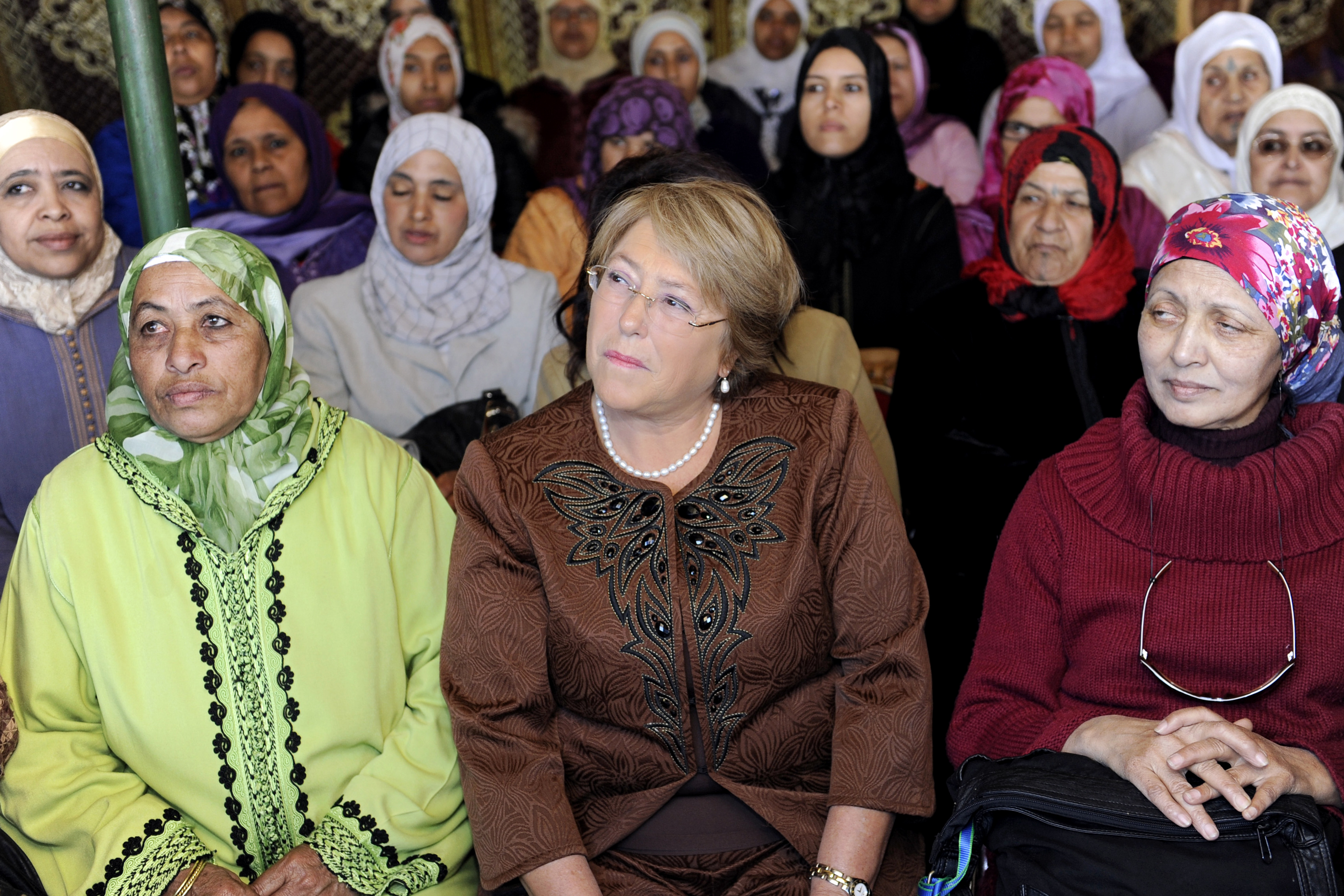
Michelle Bachelet 16:13
Well, we were not in a prison prison, we were in a place of detention but that was clandestine. Because prisons are under gendarmerie (police forces), you are publicly there. I mean, my father, before he went into the public prison, he was in all these little places where nobody knew where he was. And we were taking from my home to these places that don't exist. So they are sort of clandestine prisons, that they were in the hands not of their prison guards, they were in the hands of the intelligence agencies. So those were the people who would guard us, if I may say, and these guys weren’t nice, they were not really nice.
And so first, we came together with my mother, but then they separate us, in this so-called Villa Grimaldi, that is a very well-known centre for detention and torture. But I mean, after democracy, it was very well-known and before we knew the people who have been there. My mom, they put her aside in another place and they put me in a room, we’re all blindfolded, of course, with other women, and I had to see some terrible things there. I mean, I was not the worst there, I didn't have the worst situation.
There was many more that was worse when they came back from the electricity room and they were in a really bad condition because I was studying medicine, I tried to, you know, to support them, or the woman who came who were raped by the people and so on and so forth. Also, there were so many stories that you can hear there from girls that were my age, the majority, there was one woman who was pregnant and she was really concerned about her pregnancy and how it will happen, what will happen, et cetera, et cetera.
So on the other hand, there was a sort of solidarity that is creating in that people when you are on the same conditions. You try to help each other with knowledge, for example, women who were coming after so many electricity shocks and they said, ‘I'm thirsty, I'm thirsty.’ And other women say, ‘No, you cannot drink water yet you have to stay, wait until the electricity goes out of your body. Because otherwise, you have A, B or C consequences.’ So it's, I mean, it's the kind of knowledge that probably nobody would like to learn, particularly in those circumstances. But on the other hand, it permits you to understand what happens in so many places in the world where there is torture.
And then one day, only one day one, one guard told me ‘Your mommy is okay.’ He said ‘I’m from the Air Force.’ And he said to me, ‘But your mom is well.’ And I said, ‘Can you give her a cigarette because my mom, if she doesn't smoke, she will be really suffering.’ And then they took us outside, particularly with the air because we were in this barracks, small little barracks. And he said to me afterward, ‘I gave it to her. She's okay, she sends regards.’
So it's interesting because in many times, we had villains but we also had people who were able to, to be human, if I may say. They were doing their job, but they did it in a way that was much more human than other people. It was interesting because afterward then, they took us to another of this sort of centre that of course, was clandestine and there we stayed a week more and then from there, I was released. Suddenly I was released. They said, ‘Okay, you can leave.’ And then my mother who was not released from there, she was... so I started calling the Air Force saying, ‘Look, you have to release my mother because she's... You have to and we need this’ and so on, and trying to convince them..
And then they sent her to a station of the judicial police and then a detective came to her and was very nice to her. Why I mention this? Because when I was President and my mother was always attend to this ceremonies of the different police and so on forces. Then she told the Head of the Judicial Police at the time that there was this person who really treated her so humanely that offered her tea or something like that. And she was cold and [he] offered her something to wear. And then they identify who was him. And there was a meeting with my mother and him. And it was fantastic. Because so many years afterward and the man is saying ‘I was only doing my job, sorry’. And she was saying, ‘No, you were great.’
So it was interesting because you could... you could find, like, a real encountering of people who were seen as adversaries in the past. But at the end, we're human beings, and they can, you know, work and relate to human beings. I was taken to the airport, and just only in the airport, they put us in a special place where I could see my mother after three weeks. Because when we were in the second place, she was in a different room. So what we did is that when it was in the night, there was a room next to the other so we opened the windows and we could talk through the window without [them] seeing us. So we could talk through the windows, ‘How are you?’ We had a lot of strength and so on. But you know, Melissa, I haven't spoken about it for so long that I'm just remembering all these things.
Melissa Fleming 21:41
I can imagine it's I mean, I'm sure you draw from it somehow in your current work and we'll come to that. I wonder why they they spared you from the torture and your mother and why they let you then go and into exile in Australia and then East Germany?
Michelle Bachelet 22:01
Yeah, there was, I mean, there was psychological torture but not physical torture in my case, I have to say. When these agents of the intelligence service went to pick us at my home. Suddenly, the phone rang and it was my boyfriend at the time, he was from a political party. And because we knew that things could happen, we had sort of certain codes that I could tell him, ‘Look, we are here with these guys.’ So they started an international campaign for our release. So I think that's the main issue because they were aware.
And the other thing, I guess, is the following. At that time, my brother's... my nephews were at home, in Chile. They were at home at my mother's home that day. So when they came to pick us up, we told them, ‘Look, these two children are Australian citizens, you cannot take them and we need to give them to their mother.’ So they let us call her so she came home and picked the children so she also could give the information to other people. And she called my uncle and my uncle was a general of the Air Force at that time. I mean, not at that time, he was a former because they asked them to leave it after the coup d'etat. But he knew everyone. She started calling the Air Force immediately saying you have to ring the Commander in Chief of the Air Force. He had been in a higher rank than the Commander in Chief at the time so he started calling them. But also the Commander in Chief was a very good friend of my father when they were young.
So I think there was a lot of that. They told me afterwards that they said, ‘Look, treat them a little bit better,’ if I may say. So I think it was because of international awareness and that's why it's so important sometimes, you know, to speak up because if nobody had known, we don't know what would’ve happened.
Melissa Fleming 23:52
So then you left, you went and joined your brother in Australia, you and your mother. And how long did you stay there? Because then I believe you went to East Germany?
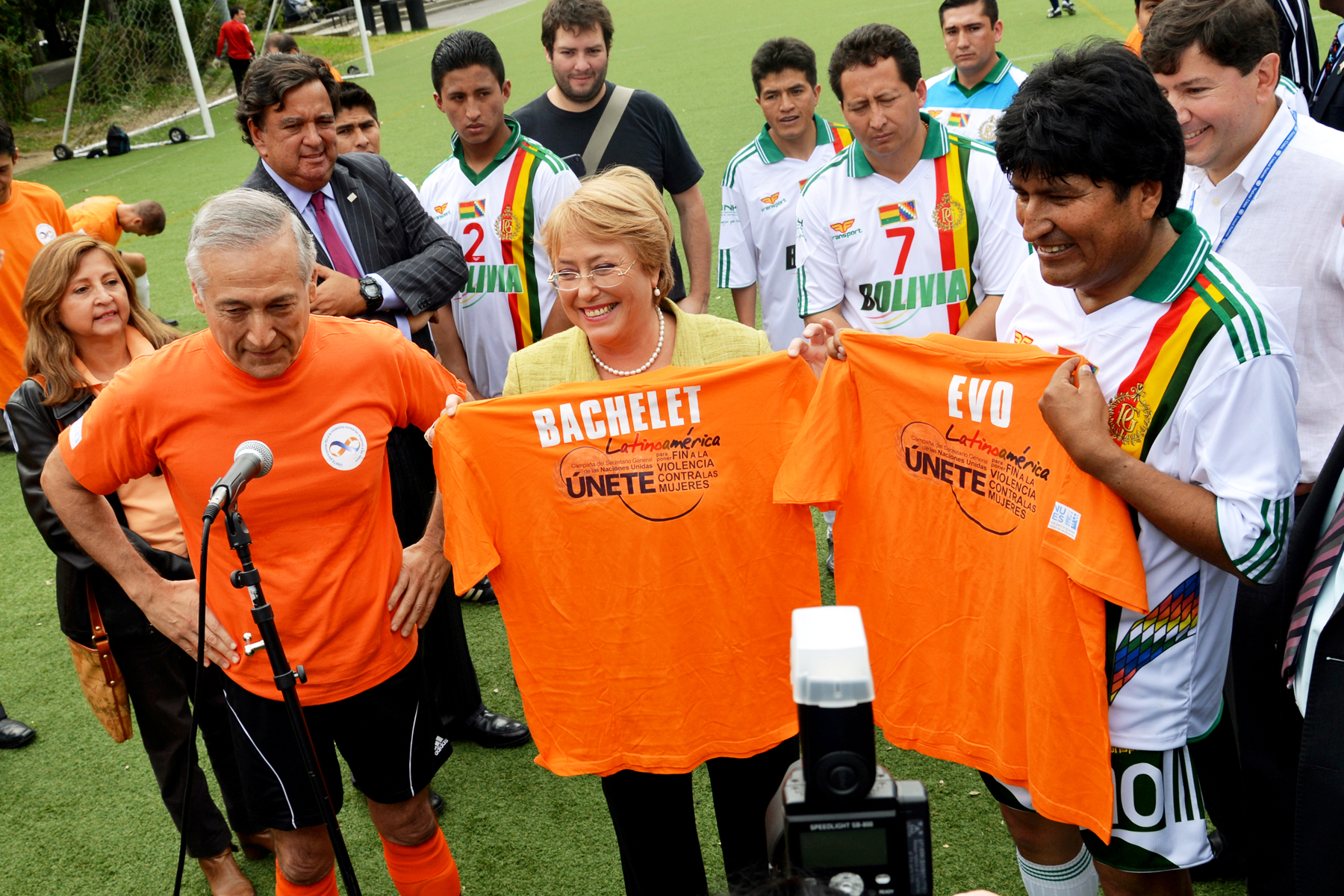
Michelle Bachelet 24:04
For a short period of time, because I was a member of the Socialist Youth, so I went to Germany because there was the headquarters of my party and the youth. Because I thought Australia is so far away from everything. I mean, it's a lovely country. They treated us wonderfully, really I had a great experience there. But I wanted to go back to Chile as soon as possible, that was what I wanted. So I said, ‘If I'm so far away, when can I go there?’ Some days I've asked myself, Melissa, when I have gone to Australia for work reasons, as a president or as Minister or UN Women, I've asked myself what if I had made other decisions in life? Maybe my life would be completely completely different. But anyway, I did the decision that I thought they were the right ones and I went there to sort of in transition to go back to Chile. That was my objective to go back to Chile.
Melissa Fleming 25:01
But in transition, I believe you met your husband?
Michelle Bachelet 25:04
Yes, I met my husband, a Chilean man, we married. I got pregnant, I had a child there and also I studied in the city of Leipzig, the German language because I did not know anything about German language. And then I started to continue my medical studies in the Humboldt University in Berlin. But then, as I said, I wanted to go back as soon as possible to Chile. So when my son was eight months old, we decided to go back to Chile.
I also understand, for example, when we're talking about stateless people, because, for example, my son because there was cut relationship between the government, Chile, and the GDR, he had no citizenship, because there was no relations. So when I went to the Chilean consulate in West Berlin, I went with him and the only way to give him a passport is that he could be in my... I embraced him like a baby so he could be my passport with a baby, whatever, but with no citizenship. He was stateless.
And at that time, the laws in Chile is that when people were born abroad, you have to be at least one year in the country to be able to get your nationality back. So well, that happens. But so I mean, I have been leaving all these kinds of different issues that you leave when you have all these situations.
Melissa Fleming 26:30
Why did you want to go back to Chile?
Michelle Bachelet 26:33
Oh, because it was my country. My people were suffering. I had to do what I had to do. That's my... I don't think it's a motto, it’s more like I always say that I think in my milk bottle, the word responsibility was there. Because I always react with responsibility. For me, it’s very difficult to think what about me first? What do I really want to do now? I mean, I know I'm needed there so I have to be there. I really can help them. It’s like...

Melissa Fleming 27:05
Other people would have been quite afraid, weren’t you fearful?
Michelle Bachelet 27:10
Well, there's a lot of people who did not go back for me and some people who never went back. Yeah, it's true. But I am not. I mean, I knew it had risks. But I thought... I always thought, you know, so many people have died because of the cost of democracy and freedoms. So I didn't want to die, of course, but I cannot stay abroad. I cannot stay at home knowing nothing. I have to do something. Of course, when I had a little child, there was some things that I could do and some others not. But you always can do things and be the voice of the voiceless in some way or another.
Melissa Fleming 27:58
So you worked kind of clandestinely, as an activist?
Michelle Bachelet 28:03
Yeah, I guess. I mean, even a little bit lighter if I may say, because I had a little boy, yeah. We did some things, but also some public things because at the end, they were, you know, women's movement that went all into a big theatre And we were all singing songs that were for democracy and for liberty and for freedoms and so on. I mean, it is a bit of clandestine activities as well, but also some public activities.
Melissa Fleming 28:33
It was 1990 when democracy was restored in Chile. What was that moment in time like for you and what were you doing then?
Michelle Bachelet 28:42
Well, there was one thing first, and it was that Pinochet tried to… made a referendum to try to stay for eight more years. And of course, we all mobilise and went massively to vote, even though some people will say, ‘Look, this is going to be a fraud. These guys are not going to accept this. It doesn’t matter, we have to go. We have to show that the majority of this country doesn't want him anymore, [we] want him to leave and though no one like I don't remember exactly, but incredibly high. And then we all went out to the streets. I mean, even though it was a military, we were all there with flags, and everybody was embracing themselves. And so it was so beautiful.
And fortunately, they realised it was better to permit this celebration and not to repress it. So then came the election so I went with my daughter, my small daughter, to vote and I said to her, ‘Look, never forget this because this is a very important moment in the history of Chile. It is the first time that we're going to vote to restore democracy.’ And she was small. Well, now she is a feminist and very active.
Melissa Fleming 29:48
And then you became part of that New Democracy. You took a number of positions in government ministries, and you eventually became Health Minister, Defence Minister, and then the first woman, even in Latin America, ever to hold the position of Defence Minister. What was that like for you?
Michelle Bachelet 30:11
I mean, at the beginning, I was just the normal “funcionario” (civil servant), a very low level doctor who worked in the Ministry of Health. I was not [in] a high level position. And then, of course, after a new government, the President Aylwin was won and he asked me to be Minister of Health, even though the last two years before that I had studied military issues. And I started because I thought, ‘Look, in Chile, we had a coup because military don't speak with politicians, they don't understand each other. And militaries understand about power. So I want to have the power of knowledge, to be able to discuss with them military policies.’
And then I became a Minister of Health. And incredibly, because I don't think it's my merit, it’s because in my country for so many years, there were so few women in positions, I was the first female Minister of Health in my country. Then I was the first female Defence Minister of my country, but the fifth in the world. I mean, it's terrible that women were so away of those kinds of positions at that time.
And then I was President, of course, because I think Minister of Defence showed people that I could do things that if I would have been Minister of Health they might not think about it, because Minister of Health is about caring. It's like female, [a] more female thing and defence is more like a power symbol.
Melissa Fleming 31:34
What if you look back on that time? What are you most proud of achieving in your service as president of Chile?
Michelle Bachelet 31:41
Well, I think... I mean, I always said that I wanted to, to address the inequalities in my country. We did a lot in terms of improving or expanding, if I may say, rights, social rights, economic rights, of course, trying the country to continue growing and, but that the economy that has prosperity could be shared. And not only for a few. Also, I would say, we did a lot of things linked to human rights. And we created the Institute of Human Rights, the National Institute for Human Rights.
But we also created something that I'm very proud of. And so people who go to Chile, please don't forget to go, there is the Museum of the Memory and Human Rights, because it was like it was not the whole history of Chile was from the coup, and afterward. But in a sense, to show with pictures with movies with, I mean, films, with objects, because the victims and the families gave us lots of material to make it with pictures and so on, and what happened to children, what happened to many people. But the main message, it was not the message of vengeance, of vendetta, it was a message: ‘Look, this brought us, I mean, the capacity of working together and to understand together brought us this. Now, our responsibility is to never come back to this. So we may not be all responsible for the past, but we are responsible for the future.’

Melissa Fleming 33:11
All of these pillars of democratic society is what you've brought with you to the international stage now. So how is this experience as being the leader of Chile contributed to your kind of worldview, as you, you know, took the helm of UN Women and then now you’re the leader of the human rights arm of the UN, the UN High Commissioner for Human Rights?
Michelle Bachelet 33:42
Well, I think all my experience all over my life has helped me to bring to this position now, to understand better how the world functions, to understand better that, I mean, the importance of human rights, of course, I have it in my heart in my life, my experience. But on the other hand, understanding that my mandate is a mandate, not only to, of course, I have to denounce and be the voice of the voiceless. But I also need to engage member states. I need to ensure that they really are convinced that they need to play a substantial role in protecting, promoting, and ensuring human rights.
The narrative cannot be the same for everyone. That does not mean that you change the substance but you adapt it in a way that it makes sense to the person because there's so many stigmatisation, stereotyping and prejudice on many of these decisions. Or simply don't think that human rights are [an] important thing. Some countries say that this is a Western invention and of course, it's not a Western invention. And I always say, ‘Look, any mother in any part of the world wants her children to be safe, to be warm, to have food.’
Melissa Fleming 34:56
I just wonder though, this is been a really, tremendously difficult year for the world, the COVID-19 pandemic, but it has also, and I've heard you say this as well been used by some governments as a pretext to clamp down to change laws and what keeps you awake at night these days in the human rights dimension?
Michelle Bachelet 35:26
Well, unfortunately, many things because the world is not getting better, it’s getting worse. You know, in some minute, I had this sort of, how could I say, hope that the pandemic will play the same role that the world wars played. That people will say, ‘Come on, we need to live in a different way. We need to learn how to respect each other. We need to have minimal, so if I would say, civiliatorian standards where all people are entitled.’ We have to build back better, as we have said. But on the other hand, I don't see that happening.
I mean, it did not happen in the beginning of the pandemic, everybody was working by the side, everybody fighting, for getting the ventilator for themselves, the PP for themselves, and so on. And now we see, at least in practice, maybe not theoretically, in practice countries fighting for vaccines they don't get so we have not seen yet but we know it's indispensable for this challenge and other challenges that is the strong international cooperation and solidarity and collective solidarity. We have not seen it at the level that we need.
Some people tells me ‘How do you... not only what keeps you awake but how could you wake up the next day?’ And I only say that, I always remember Desmond Tutu always say that he's a prisoner of hope. So I think that's important is to be a prisoner of hope in terms of not giving up because the day you lose complete hope you have to go home. So it's like, yeah... Some days, it's pretty tough I have to say, because you try to do your best. You try to convince parties to do something different, but it doesn't work. But sometimes it works and that's worth it.
Melissa Fleming 37:15
It's hard to be that prisoner of hope. But you must do some things to relax, what do you do in your downtime?
Michelle Bachelet 37:25
Well, sometimes I see movies. When I arrive home at night, I prepare something to eat and then I look at the television. But, of course, in the night. In the mornings, I see the news and I've been sort of recovering my appetite for reading because I… for many times I've had so much material to read that I didn't have sort of the calmness in myself to sit and read literature or whatever.
And I hope time improves and I can swim because I love to swim and I like to go with friends to have dinner to some nice place and now in Switzerland, now you can do that. Before it was very difficult. At first, it was only terraces and before it was impossible. So to try to see friends because I think you need to... even if you talk important things but sometimes you also can talk with friends, women friends, silly things and I laugh a lot. I don't have a guitar here so I've not being had not been playing the guitar or singing but sometimes when I hear songs I can sing because that makes me relax a lot.
Melissa Fleming 38:42
Somebody should bring you your guitar. Michelle Bachelet, thank you so much for joining us on Awake At Night, and all the best with the many areas of human rights work that are encompassed in your vast mandate. Thank you for joining us.
Michelle Bachelet 39:01
Thank you very much, Melissa. All the best for you and everyone.
Melissa Fleming 39:10
Thank you for listening to Awake At Night. We'll be back soon with more incredible and inspiring stories from people working to do some good in this world at a time of global crisis. To find out more about the series and the extraordinary people featured, do visit un.org/awake-at-night On Twitter we’re @UN and I'm @melissafleming. Michelle is @mbachelet. Subscribe to Awake At Night wherever you get your podcasts and please take the time to review us. It does make a difference.
Thanks to my producers Bethany Bell, and the team at Chalk & Blade: Laura Sheeter, Cheri Percy, Fatuma Khaireh, and Alex Portfelix, and to my colleagues at the UN: Roberta Politi, Darrin Farrant, Elizabeth Dupuis, Tulin Battikhi, and Bissera Kostova and also the team at the UN studio.
The original music for the podcast was written and performed by Nadine Shah and produced by Ben Hillier. The sound design and additional music was by Pascal Wyse.
The pandemic is exacerbating the marginalisation, bullying and violence that many people with albinism are subjected to around the world. Today, on #AlbinismDay, I call for solidarity with all people with albinism, in their struggle to live free and safe. pic.twitter.com/KkljEnzcfA
— Michelle Bachelet (@mbachelet) June 13, 2021

